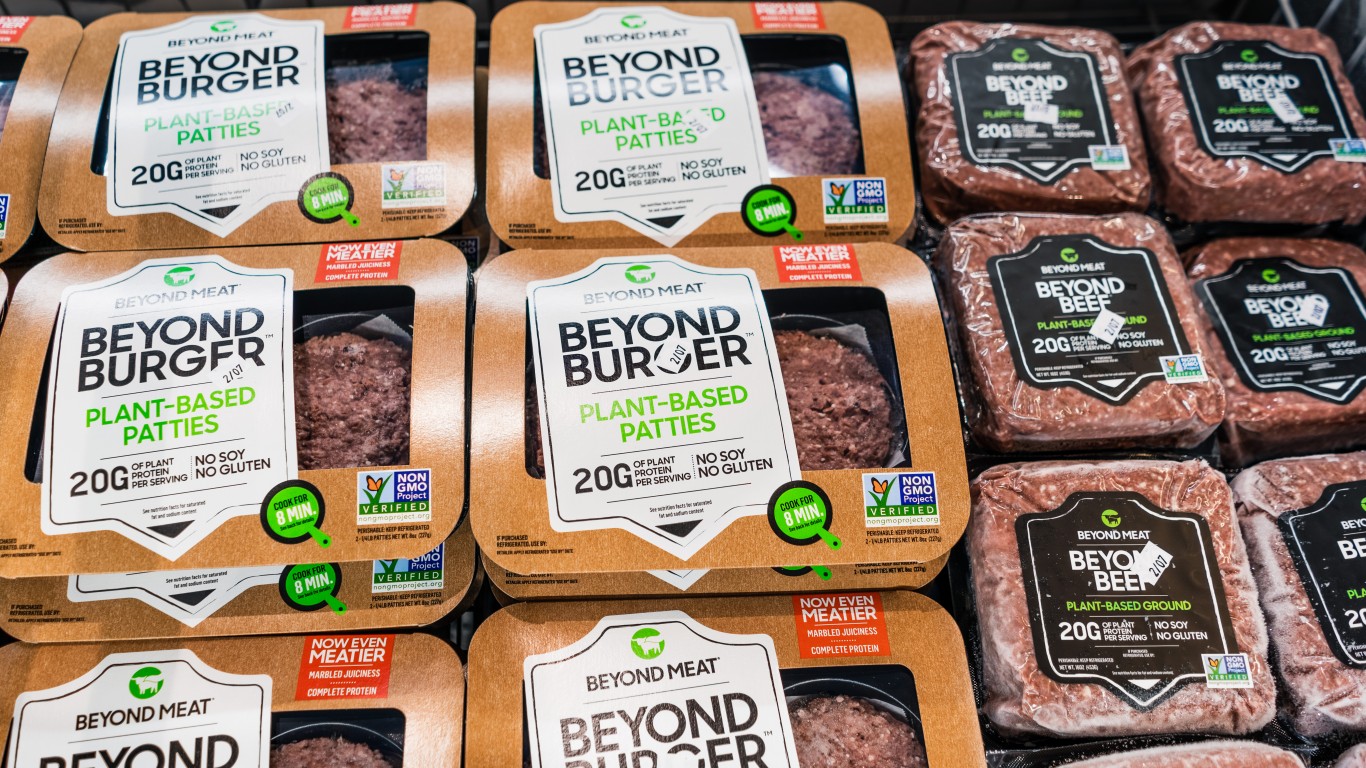
Believe it or not, Beyond Meat, Inc. (NASDAQ: BYND) has been one of the best-performing stocks through this COVID-19 pandemic. There have been many on both sides of this trade since the company went public last year, but there is a growing consensus that Beyond Meat is the real thing.
Many food producers have felt the impact of COVID-19. In fact, some have shuttered their meat packing plants temporarily over coronavirus concerns. However, for the most part packaged foods companies have largely outperformed the stock market. Beyond Meat is far and away the biggest winner of this group. Its stock is up about 78% for the year to date.
As some food supply chains are becoming constrained, meat substitutes have become a very real alternative for consumers. Also the pandemic has pushed more consumers towards healthier options, further adding to the wave that is plant-based food, and specifically plant-based meat. These are just a couple of the trends shifting consumers away from traditional meat when they visit the grocery store or shop online.
Overall, Beyond Meat has demonstrated solid fundamentals. It is making moves to expand even further and continuing to gobble up market share from competitors like Impossible Foods.
Back to China
In mid-April, Starbucks Corp. (NASDAQ: SBUX) announced that it would be partnering with Beyond Meat to bring plant-based meat to China. This partnership is huge for a couple of reasons. First, China is a largely untapped market, and second, Starbucks has one of the largest business footprints in the world.
Getting into China via an incredibly successful coffee chain could prove lucrative. If the Chinese people take to plant-based meat like the American public has, then Beyond Meat will see a tremendous windfall.
As part of the partnership, Starbucks is rolling out a plant-based lunch menu in China and Beyond Meat products are front and center. Starbucks has reopened a majority of its locations in China and is now looking to try something new there.
The new lunch menu features lasagna and other kinds of pasta using Beyond Meat’s plant-based beef products, and includes dishes from Omnipork, a plant-based pork alternative brand.
Ultimately, the launch is an important stepping stone for Beyond Meat, which is looking to expand into Asia, where meat alternative products still have not experienced the popularity seen in the U.S. and parts of Europe.
As part of the launch in China, Beyond Meat is establishing a Chinese-language website and will make use of popular social media channels Weibo and WeChat.
Again, if Beyond Meat can stick the landing, the company will continue to see explosive revenue growth like it has seen over the past few years.
Fundamentally Sound
Beyond Meat has been a public company for just a little over a year, but in this time the stock price skyrocketed and analysts chased it even higher with their price targets. While the stock did drop off from its high of roughly $240 last summer, the value proposition is still encouraging.
In its most recent quarterly report, the faux meat firm posted $0.03 in earnings per share (EPS) and $97.1 million in revenue. The first quarter from last year had a net loss of $0.95 per share and $40.21 million in revenue.
Here’s what most investors were looking at in the report: Net revenues increased by 141% year over year. Growth in net revenues in the fourth quarter of 2019 was primarily due to an increase in volume sold, partially offset by lower net price per pound.
Overall, growth in volume sold was driven mainly by expansion in the number of distribution points both domestically and abroad, higher sales velocities at existing retail outlets, and the introduction of new products after the first quarter of 2019.
Beyond Meat’s retail segment revenue increased 157% in the U.S. and a whopping 4,944% internationally, while revenue for the restaurant and food service segment increased 156% in the U.S. and 57% internationally.
Even though Beyond Meat is still operating at a loss on an annual basis, this is counterbalanced by revenue growth. This company is the subject of much debate for value investors versus growth investors.
Value vs. Growth
Value investors looking at this company don’t have much to go on. First, operating at a loss is never good, and the argument can be made that even with sales growing exponentially the company is still losing money.
The question is, when will Beyond Meat turn things around and start making money to return to shareholders. This could happen sooner than we think with the move into China, but that remains to be seen.
The case for growth investors makes itself with sales growing at an exponential rate, combined with further expansion across the globe.
It’s hard to argue against this kind of growth.
Are You Still Paying With a Debit Card?
The average American spends $17,274 on debit cards a year, and it’s a HUGE mistake. First, debit cards don’t have the same fraud protections as credit cards. Once your money is gone, it’s gone. But more importantly you can actually get something back from this spending every time you swipe.
Issuers are handing out wild bonuses right now. With some you can earn up to 5% back on every purchase. That’s like getting a 5% discount on everything you buy!
Our top pick is kind of hard to imagine. Not only does it pay up to 5% back, it also includes a $200 cash back reward in the first six months, a 0% intro APR, and…. $0 annual fee. It’s quite literally free money for any one that uses a card regularly. Click here to learn more!
Flywheel Publishing has partnered with CardRatings to provide coverage of credit card products. Flywheel Publishing and CardRatings may receive a commission from card issuers.
Thank you for reading! Have some feedback for us?
Contact the 24/7 Wall St. editorial team.
 24/7 Wall St.
24/7 Wall St.

